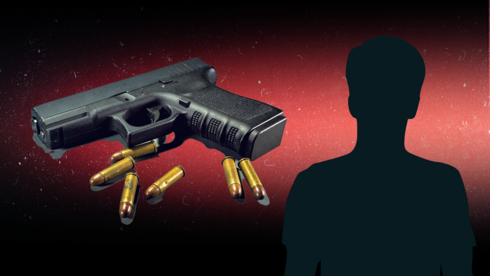The Nobleman: How an ex-criminal turned undercover agent exposed Israel’s gun and drug networks
By Guy Assif
Copyright ynetnews

Rahat, Sunday, late May. Inside an unmarked police vehicle serving as a mobile command post sit Superintendent T., head of the undercover agents division in Lahav 433 — the police’s elite investigations unit — and Sgt. Maj. D., a veteran agent handler. Both are tense, listening closely to an Arabic conversation broadcast to them. For several months, they have been running an undercover source given the codename “The Nobleman.” The name, they say, came naturally: the recruit, drawn from deep inside the Arab crime world, has two passions — trading in weapons and drugs, and horses. “Passion? It’s more like an obsession with horses,” D. explains. The handlers know their source is a wild horse himself, a man with a long criminal record, someone who has been shot before and whose relative was murdered in gang wars. But they hope to rein him in, to turn him into a noble steed. Hence the codename. For nearly a year, “The Nobleman” has infiltrated meetings, won the trust of arms and drug dealers — trades that often overlap in the Arab sector — and carried out transactions. Not too large, to avoid suspicion, but not too small either, to keep the dealers interested. What matters most: he wears a hidden microphone, sometimes even cameras, capturing everything from the first exchanges to the deal itself. One by one, he has conducted more than 30 such deals. An agent willing to risk his life and betray the codes of the underworld is rare. Within the Arab sector, it is almost a miracle. The great fear is that someone will expose him and that “The Nobleman” will be killed. That is the nightmare haunting T. and D. On this occasion, “The Nobleman” was sent to meet a man named Muhammad Shakir. According to the indictment against Shakir, the two had already done business: the agent bought 150 grams of cocaine from him. Now, handlers hoped to gather evidence of arms trafficking. The target was a Glock pistol. But this time, Shakir set the meeting in Rahat. “It’s unfamiliar territory for the agent, and very hostile to police,” the handlers say. “The neighborhoods are crowded, and people are alert to anything unusual. For the undercover security teams there to protect him, it’s a huge challenge. Not only the suspects might expose him, but the wider community too, which can spot outsiders as undercover cops.” At first, they recall, the meeting unfolded as usual. “The Nobleman” arrived, and so did Shakir, accompanied by several men. “They talked about the deal, and everything seemed normal,” D. says. “But then they went into a nearby building, and suddenly he vanished from us. We completely lost contact.” Nothing at all? “Nothing. We wanted to know what was happening, if something had gone wrong — but we got nothing.” What goes through your mind at that moment? “Not good things,” D. admits, glancing at his commander. “For example, he” — nodding toward T. — “was already seeing the worst-case scenarios play out in his head.” “You ask yourself: was he robbed? Exposed? Murdered? What do we do now? We can send in an operational team, blow everything up and arrest everyone. But once you do that, the consequences are huge.” Superintendent T.: “He’s with criminals he doesn’t know well, in their home turf. We’re the ones who sent him there, and we’re the ones responsible for making sure he comes out in one piece.” Then the tension ratchets even higher. There’s still no sign of life from “The Nobleman,” but the handlers suddenly see Muhammad Shakir bolt alone out of the building. He runs to the agent’s car, opens the door and begins searching for the cash meant for the Glock deal — 39,000 shekels. He finds the money, takes it, and disappears. Superintendent T. can picture only the worst outcomes, facing a wrenching dilemma. “You ask yourself: was he robbed? Exposed? Murdered? What do we do now? We can send in an operational team, blow everything up and arrest everyone. But once you do that, the consequences are huge. It could mean that by tomorrow we’re forced into the bust (the day of mass arrests when an investigation goes public), and we’ll have to round up all 50 suspects we’ve worked on this past year — before we’re ready. On the other hand, you know the agent, you know his skills. You’ve run alongside him for a year, and you know he can get out of tough spots.” Sgt. Maj. D., who has come to know “The Nobleman” closely over the past year, pleaded with his commander: wait a few more minutes before blowing the operation. At this point, how long had the agent been out of contact? “More than an hour,” D. recalls. “And every minute felt like an eternity.” Then, just before police were about to storm the building, “The Nobleman” suddenly walked out — alive and unharmed. “We let out a huge sigh of relief,” D. remembers. “You hear him, you see him — and your pulse finally steadies.” The agent got back into his car and drove away. Only once he was far enough did he call headquarters to explain what happened: Shakir and his men had simply taken him down into a basement. They weren’t suspicious — it was just a safe place for them to complete the deal. The Glock was with “The Nobleman.” But what about Shakir running up alone to the car and taking the money? The handlers asked. “Oh, that,” the agent laughed. “My back was hurting, so I sent him to fetch the cash.” That was the last time police ran “The Nobleman.” Over the course of the operation, the agent carried out deals implicating more than 50 people from north to south. Last month, prosecutors Inbar Eliav Rieger and Noam Elimelech Levy from the Central District filed indictments against 40 of those arrested, most of them from the Arab community. Every seized weapon, police note with pride, is one less gun that could kill. Now, “The Nobleman’s” handlers are sharing how they recruited and ran a former criminal who shattered the underworld’s code — and became one of Israel’s most consequential undercover agents. The motive: Revenge By nature, most details about “The Nobleman’s” life remain classified. His handlers will only say that he lives in a town in the Triangle region. For much of his life, he was immersed in crime, earning a living from drug and weapons deals — often conducted from his own living room. He had the connections, the language and a deep understanding of underworld codes and behavior. In a world where one wrong word can expose an agent, he was close to the perfect recruit. A few years after he was shot, a relative of “The Nobleman” was murdered — an event that, Superintendent T. says, left a deep mark. “There wasn’t a single conversation for a year in which the subject didn’t come up. He wanted revenge. It’s possible that that’s when the idea of doing something extraordinary began to form in him.” The undercover agents unit is part of Lahav 433’s International and Serious Crime Division, which focuses on organized crime. Its members are constantly searching for the rarest of resources: criminals willing to turn against their peers. Intelligence flows in from units nationwide, and the handlers sift through names before summoning candidates — sometimes under far-fetched pretexts — for an interview. “I’m looking for people who can withstand pressure, improvise and think creatively, but above all, who have a genuine will to work with us,” explains handler Sgt. Maj. D. The handlers also try to identify pressure points. Often it’s a criminal with pending cases who agrees to cooperate in exchange for having them dropped. Sometimes the payment is financial, or a chance to start a new life under the witness protection program. More rarely, the motivation is ideological or personal. Revenge, for example, can be a powerful reason to cross the line. Many who agree to become agents do so for a combination of these reasons. Next, the recruit gives what is known as a “cleansing testimony,” confessing in detail to his own crimes. This lets the handlers map his connections and conflicts and ensures prosecutors will not be blindsided in court. Afterward, the recruit signs an agreement with the State Attorney’s Office spelling out the terms: dropped charges, financial compensation and other conditions. “The Nobleman” fit the profile perfectly. “He’s a real street cat,” says D. “Because of what he’s been through, he talks like he’s 60 — but he’s only in his early 40s. He dropped out of school very young and went straight into crime.” The handlers won’t say exactly what he received for his service, but it can be assumed that some of his criminal cases were erased and that he was paid. But there was also the element of revenge. “About 20 years ago, during a clan feud in the Triangle, someone tried to assassinate him,” D. recalls. “They shot him seven or eight times. He survived, but with metal plates throughout his body — and he still suffers from it today.” A few years after he was shot, a relative of “The Nobleman” was murdered — an event that, Superintendent T. says, left a deep mark. “There wasn’t a single conversation for a year in which the subject didn’t come up. He wanted revenge. It’s possible that that’s when the idea of doing something extraordinary began to form in him.” Why revenge? Was one of the targets you indicted connected to the person who harmed his relative? “He himself is feuding with and threatened by the person who harmed the relative, which means he can’t confront him or do business with him.” So he couldn’t reach the man who killed his relative during the operation and therefore couldn’t take revenge directly. “Correct, but he knew that going in. In his view, the criminal world as a whole had to pay. It’s that world that hurt him, and now all criminals should suffer. More than that, he implicated people from his own side — supposedly friends and partners in past crimes.” About a year ago, “The Nobleman” agreed to the deal, signed the agreement with the prosecutor’s office and began working. Every deployment of an undercover source in the unit is called a “launch.” Before each “launch,” an operation file is built detailing the intelligence on the target, and the agent and his handlers rehearse scenarios: what if the target suddenly backs out? If he pulls a gun? If he screams, “You’re an agent!” and so on. Handlers monitor every launch and the agent is accompanied by undercover teams who can intervene quickly if needed. Despite all the preparation, the handlers say, the start of “The Nobleman’s” run was far from promising. “It was rough,” D. admits. “Deals stalled and he was a bit insecure and very closed off with us.” “The Nobleman” used his existing contacts to set up relatively small drug transactions — a few dozen grams per deal, mainly in the Triangle area. They were recorded, but the operation wasn’t designed for a few grams of cocaine. “The main concept of the operation was to deliver a major blow in the weapons trade, which is how many killings in the sector are carried out,” D. says. The division decided to wait patiently. ‘After everything we’ve been through, I’m bringing you down’ The wait paid off. Small-time dealers the agent knew from his past began connecting “The Nobleman” to bigger players. That’s what happened in the case of Ahmad Salameh, a longtime friend from the Triangle. According to the indictment, Salameh sold the agent 180 grams of cocaine in two separate transactions. A respectable haul, but hardly the kind of event that would dry up Israel’s drug market — and still far from the handlers’ objective: deadly weapons in the sector. Still, those two deals were enough for Salameh to introduce the agent to an alleged arms trafficker — even if the meeting may have been incidental. Earlier this year, Salameh and “The Nobleman” met friends at a cafe in Haifa. A local young man, Adam Abu-Alhija, who is friends with Salameh, joined them. Abu-Alhija showed “The Nobleman” photos of various weapons on his phone, including an M16 rifle, the indictment says. Abu-Alhija had not been on the operation’s original target list, but the agents’ unit and prosecutors decided that an alleged arms dealer was worth adding. According to the indictment, the agent and Abu-Alhija arranged to meet in an office building in Haifa’s wholesale market, where the weapon was to be concealed. Abu-Alhija had a key to the office, but in the crowded space he could not find the bag with the weapon. Police say he then made a video call to someone who guided him precisely to the hidden bag. Those listening in on the recording were pleased: the call implicated another person allegedly connected to the deal. “The Nobleman” took possession of the weapon, which arrived disassembled he quickly and skilfully assembled it, checked that it was an original, functioning rifle. The indictment says Abu-Alhija received 65,000 shekels for the deal. Is Abu-Alhija likely a major, central arms trafficker in the sector? Very unlikely. But much of the weapons trade there works exactly like this: one rifle here, one pistol there. An agent who takes down even a single dealer — even for one rifle — may have prevented countless deaths. After the arrests came the part “The Nobleman” feared most: confronting his former associates. This time he was summoned to face his old associate Ahmad Salameh. Superintendent T. said: “It’s standing in front of people you grew up with, who see you as a friend and brother, looking them in the eye and saying: I’m an agent and I bought weapons from you. After everything we’ve been through together, I’m bringing you down.” And how did that go? “That was the hardest thing for ‘The Nobleman’ in the operation.” Turning the tables Over the past six months, the Abu-Rkaik family in Tel Sheva has suffered three murders. In June, two female family members, sisters aged 18 and 20, were killed in what police suspect was an honor-related crime. In May, an eight-year-old boy from the family was shot dead in an attack on a wedding procession investigators believe that killing was linked to clan feuds. Those cases remain under investigation, but the handlers of “The Nobleman” were keen to reach the family’s arms dealers. Leading the investigations connected to “The Nobleman” is Superintendent Sharly Hardan, head of the organized international crime division. “I conduct the orchestra,” he says. Hardan told reporters that a jailed relative of the family informed his brother, Muhammad Abu-Rkaik, about “The Nobleman.” The link between the police source and Muhammad Abu-Rkaik developed, as usual, with a small trust-building transaction. According to the indictment, Abu-Rkaik offered to sell the agent 200 grams of cocaine at an attractive price of 140 shekels per gram — far below market rates, which range from 600 to 800 shekels per gram or more depending on quality. The handlers green-lit the deal and the agent traveled to a site near Tel Sheva to buy the drugs. “Then they chase after the agent so he will keep buying from them,” Hardan says. In the days that followed, prosecutors allege, Muhammad Abu-Rkaik sent the agent photos and videos of weapons, including an M16 rifle — exactly what the team had been waiting for. The handlers say “The Nobleman” went with Abu-Rkaik into a warehouse, where he inspected the rifle while Abu-Rkaik counted the money — 70,000 shekels. Then everything unraveled. “While they were in the warehouse examining the weapon,” Hardan recounts, “Muhammad received a call that police were conducting searches in the area.” The handlers, T. and D., were in their mobile command vehicle as usual and listening in. The arrival of police surprised them too. “At that time, there really was an unrelated search at another house,” Hardan says. “These things can happen, because our activity is covert and compartmentalized even within the police.” Both handlers understood the deal was about to turn dangerous. “Weapons transactions like this are highly organized,” D. says. “There are always lookouts at the village entrance to warn of police.” According to Hardan, Muhammad panicked and told “The Nobleman” to leave and drive to a gas station outside the village. What about the rifle? Police say Abu-Rkaik promised that another family member’s car, nicknamed “the Lame One,” would follow The Nobleman’s car and carry the rifle. The agent had no choice he got into his car and drove to the gas station. But the trailing vehicle suddenly disappeared at a turn. The agent arrived at the station with neither the rifle nor the money. Headquarters demanded an immediate response. “I told him (The Nobleman): Listen, you go back now to Muhammad’s house and don’t move until he returns,” D. says. A new problem had surfaced: Muhammad and the others already suspected their customer might be an undercover agent. Hardan: “In their conversations we heard Muhammad asking his brother in prison: Tell me, who is this guy you introduced me to? I think I got an agent. I don’t want another seven years inside right now.” The Nobleman returned to the home in Tel Sheva, and Abu-Rkaik confronted him. Handlers say Abu-Rkaik accused him of being an informant — how else to explain that police had arrived just as The Nobleman appeared? He also wanted to search the agent’s body. If a search finds the bugging devices, everything is over, T. says. “It’s catastrophic. But these are the scenarios we drill and he can get out of.” What should the agent do in that moment? “Turn the tables.” “Turn the tables” is one of the tactics handlers rehearse with the agent: when you are accused, immediately accuse back. That is exactly what the handlers heard on their recordings: The Nobleman pointing the finger at Abu-Rkaik and his companions. He argued he was the customer who had come to do a deal — and they were the ones who vanished with the rifle and the money. Did it work? “Yes,” T. says. “Then they try to calm him. They tell him: we’ll wait until things settle in the village, we’ll have a meal and bring you the weapon.” But the story did not end there. Hardan: “A few days pass and they start to string the agent along. They say something went wrong and ‘the Lame One’ was detained with the weapon. They even claim the payment was spent — money for the canteen, a lawyer, and so on.” Was that true? “No, we know it isn’t. But they are trying to exploit the moment.” And they kept the money without handing over the rifle. “They’re criminals — if they can swindle someone on the side, they will,” D. says. “We heard them talk about forging a court protocol, claiming there had been a search and that ‘the Lame One’ had been detained with the weapon. They even sent the agent a photo of the fake protocol they created.” In the end, did they walk off with both the cash and the rifle? “They tried to offer him various deals, but it ended with them owing him money,” D. says. So would a criminal really give up 70,000 shekels? “There was intense maneuvering around it,” D. explains. “On one hand, as police we can’t involve criminal elements like threatening debt collectors. On the other hand, a response was needed. Our approach was to have the agent use the intermediary who was in prison — someone who could not do much from there — to apply pressure.” Family cuts ties After about a year, police and prosecutors concluded that “The Nobleman’s” undercover mission had run its course and that all those he had recorded and documented would be arrested in one coordinated sweep. The bust took place on July 21, with more than 700 officers deployed nationwide. “Special teams are brought in for that day, but to preserve secrecy they don’t know it’s a source-driven case,” explains Superintendent Hardan. “In more complex cases involving major arms dealers, Yamam or Yamas counterterror units are used, planning the raid like a covert operation — routes in and out, door type, who the neighbors are. You don’t enter a Bedouin village full of weapons with three detectives, like in north Tel Aviv.” To process all 51 suspects, most with criminal records, Lahav 433’s parking lot was converted into a giant intake facility for booking and initial interrogations. “The detainee arrives, consults with a lawyer, undergoes a medical check, is questioned, then taken for a remand hearing,” Hardan says. “From there, he’s transferred to Prison Service facilities until he returns for further investigation.” Soon after, indictments were filed against 40 suspects, in cases where prosecutors judged the evidence strong enough for conviction. “What one agent can do,” says Sgt. Maj. D., “even many police units together cannot. He alone can penetrate deep into criminal networks and bring back the strongest evidence.” Police are satisfied with the operation but admit it’s only “a drop in the ocean” of crime in Israel. Overall, “The Nobleman” led to the seizure of 18 pistols, three M16 rifles and over 1.1 kilograms of cocaine. Not a game-changer — but if there were many more like him, the impact might be felt. And what of “The Nobleman” himself? After the arrests, he told his family about his undercover role. “They cut him off,” says D. “Once they found out he had crossed the line, they severed ties. His mother and siblings opposed his actions. For them, it was unacceptable.” Do you still keep in touch? “We speak daily. Right now, I meet him and stay close, because this is the most critical period. After the adrenaline of the operation comes the comedown, and he has to start real life.” And ensure he doesn’t fall back into crime. “You can never know for sure, but in his case I don’t think so. He wants to meet someone new, have children, start a family, work.” So what will he be now, a real estate agent in Netanya? “Yes, why not?” Responses: ‘A criminal agent whose credibility is highly questionable’ Attorney Shuaa Mansour, representing Muhammad Shakir: “This is a criminal agent whose credibility is highly questionable. My client denies the allegations. Justice will prevail.” Attorney Yossi Palacios Klein, representing Ahmad Salameh: “My client disputes the allegations. He maintains the agent is unreliable and had a prior interest in incriminating him. It should be noted that initial suspicions of arms trafficking were dropped from the indictment as baseless.” Attorney Lior Sason, representing Adam Abu-Alhija: “We have serious concerns about the agent’s conduct in this case and its implications for the charges against my client. We trust the court will examine these matters thoroughly.” Attorney Moshe Palmore, representing Muhammad Abu-Rkaik: “The indictment stems from an undercover agent whose work blurred the line between enforcement and entrapment. The operation was orchestrated and escalated by enforcement authorities. We will review the evidence and expose its flaws. The court must examine not only the acts but the methods.” Attorney Ido Porat, representing Amer Abu-Rkaik (“the Lame One”): “My client denies the allegations and maintains he has no connection to the events described in the indictment.”



